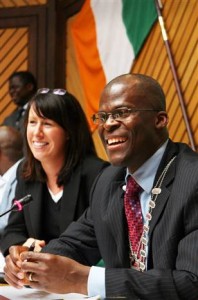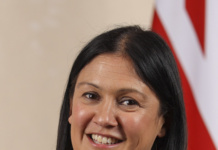Opinions vary as to the origins of the term Black Irish, which has been used for at least three centuries. Some theories explain the term as referring to the ‘dark’ disposition of historical invaders, rather than any physical characteristic. The phrase may be overdue for a 21st century redefinition.
The Obamas, as history’s first and only black ‘first family’ received a warm welcome in Northern Ireland as the President of the United States (POTUS) attended last month’s G8 summit. But elsewhere on the Emerald Isle, particularly south of the border, less esteemed black families enjoy nothing like as effusive hospitality.
During the Republic of Ireland’s economic boom of the latter part of the 1990s and early 2000s, immigrants of all hues poured into the nation’s towns and villages, taking up the plentiful roles in trades as diverse as building and IT. Relative prosperity saw to it that the Eastern Europeans, Asians and Africans that comprised the bulk of this influx suffered, in general, no more negative an experience than being viewed as a curiosity.
By 2011, however, more than three quarters of a million of Ireland’s 4.5 million inhabitants were born elsewhere according to that year’s Census. Like most of the rest of the globe, years of recession were wreaking havoc on the lives of ordinary, balanced people. Ireland was experiencing, in a kind of microcosm, what Great Britain had gone through after the British West Indians were invited in during the 1950s and the East African Asians were given refuge from the tyrannical excesses of Idi Amin in the 1970s. Representatives of more than 20,000 respondents who declared Africa as their place of birth in the 2011 Census feel their communities have become the ‘sacrificial lambs’ for the economic travails of the indigenes.
By late 2011, the climate for black people in Ireland became so toxic that some black leaders said their communities were “under siege” and suffering from widespread “verbal, physical and psychological attacks.” A group of prominent black businessmen held a press conference in Dublin in November 2011 in which they warned of “unprecedented levels of racist attitudes, attacks and a lack of leadership by the government and the institutions of the state.” They had formed the assembly in response to comments made by Fine Gael councillor Darren Scully, who said he no longer wanted to represent the black Africans in his area. Scully had earlier told Irish media that he found black Africans to be overly aggressive and ill-mannered. He later apologised for his comments and resigned as mayor of the town of Naas.
A Gallup poll taken that year revealed that 73 percent of black Africans in Ireland believed that racial discrimination was “widespread” in the country. “We demand the Irish government live up to its responsibility to protect all residents in the Republic of Ireland and to take strong measures to end racism,” read a statement from a group of representatives, which included community leaders Eric Yao of the Africa Centre; Salome Mbunge of Akidwa, a network of African and migrant women living in Ireland; and Clement Esebamen of the Ireland West Africa Business and Economic Council.
Not surprisingly, small hard-core groups of Irish nationalists have formed political organisations in order to advocate for the deportation of many immigrants. In 2010, a group called the Irish National Party (INP) — likely based on a British group of a similar name — was formed for the “immediate deportation of all illegal immigrants and asylum-seekers who (sic) have had their applications rejected.” Now defunct, the INP claimed that Ireland’s ancient culture and identity were being eroded due to “record levels of immigration and an influx of so-called ‘asylum seekers’ … leading to the development of minority communities in our cities and increasing levels of social isolation in our towns and villages.” “[We] rather seek to establish greater control over the immigration process. We recognise there is and always will be a need for some level of immigration but believe a more vigorous system needs to be put in place,” INP chairman David Barrett told the Irish Central newspaper. “We wish to see Irish identity preserved but do not believe this is possible with, for example, mass immigration or membership of an increasingly powerful European Union.”
Racism against blacks took a deadly turn in the spring of 2010 when a 15-year-old boy named Toyosi Shittabey was stabbed to death in Tyrellstown, a housing development outside Dublin. Four men were arrested in connection with the incident. The race-related killing sparked huge demonstrations in Dublin and elsewhere. Commenting on the murder, another black youth named Patrick Kabangu told Irish media: “Racism is hiding everywhere. It is in the schools. Everywhere in Ireland is racist, it is just being hidden. This country is crazy.”
In a column for The Irish Journal last year, Timi Martins, a Nigerian who migrated to Ireland in 1996 as a teenager to attend university, described some of the positive and negative experiences he had undergone, while predicting that the future will be much better for his children.
“At that time there weren’t many black people, there weren’t many Chinese people, there weren’t many Indians. But there had been a lot of black people in Ireland — for example, Ireland would have been the training ground for a lot of African nurses, pilots and doctors. So it was not a bad time, because it was more of a novelty to see a black person on the street and most people would love the opportunity to meet one, shake one’s hand, talk or whatever.”
However, there were also some very bad experiences. Martins added:
“But it was still hard. I was lucky, because there were a couple of black kids in my school and we just blended in a nice atmosphere. Only when I went out of my school for rugby matches or whatever, then I might encounter some racism. People saying stuff; people throwing eggs or saying go back home or (calling me) monkey.”
Nonetheless, Martins said he is committed to remaining in Eire:
“Ireland’s a very lovely place to live. Even though there have been cases of racism; it’s everywhere but it’s in small amounts here… Luckily for me I met my wife, I have two beautiful children (and) my business is flourishing. It’s not easy still, but I’m doing what I have to do.”
Martins also believes Irish attitudes toward race are now changing:
“You go to any school, nearly any school in Dublin there will be many children from any ethnic background. You see them walking home in pairs, you see a black kid walking with a white kid, an Indian kid, or you see a black girl and Chinese girl walking together. Even in relationships — I see a lot of black girls with white guys, white guys with Chinese girls. It’s changing completely. The next generation of kids, my daughters’ ages, when they grow up they’re not going to see any racism at all. Ireland is my home. I’m here, my family’s here.”
It is important to establish that not all Africans endure a negative Irish experience. Rotimi Adebari, a victim of religious persecution who fled Nigeria for Ireland in 2000, was elected Mayor of Portlaoise in County Laois in 2007. At the time, the University of Dublin graduate said: “Ireland is really changing. The immigrant community in the town has been growing, especially since the accession countries joined the European Union on enlargement in 2004.”
However, he added: “That is not to say that I did not have my own share of the prejudice that would be out there against maybe Nigerians, or immigrants or asylum-seekers. But I don’t let the attitude of a very small minority over-shadow the fact that the people are wonderful.”
This writer’s experience of Irish people, albeit outside their country of birth, echoes that last sentiment of their nation’s first black mayor but the deepening economic crisis, bank bailout and grim fiscal predictions that have placed a blight on the intervening years are unlikely to soften attitudes towards the new Black Irish.









